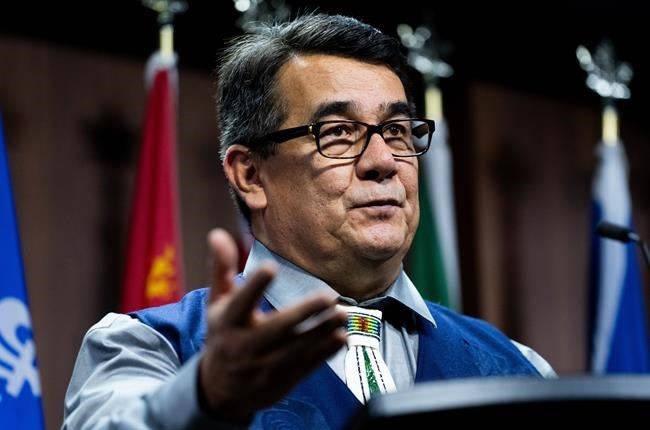OTTAWA — Indigenous leaders from British Columbia have called on the federal government to stand by plans to transition away from open-net salmon farms, but an industry spokesman suggested the leaders were wading into political waters.
The chiefs were in Ottawa to stress the importance of the federal government's commitment to removing open-net salmon farms from B.C. waters by 2025, Bob Chamberlin, First Nations Wild Salmon Alliance chair, said Tuesday. The group represents more than 120 First Nations.
The chiefs met with Fisheries Minister Diane Lebouthillier and other federal officials, telling them most B.C. First Nations want open-net farming ended to help threatened wild salmon stocks, he said.
Open-net fish farms off B.C.'s coast are a long-running subject of debate, with opponents saying they are linked to the transfer of disease to wild salmon, while supporters say thousands of jobs are threatened if the operations are phased out.
"The chiefs who have made the trip to Ottawa are here to ensure that the meetings that we have, that the government clearly understands the breadth of support to remove fish farms from migration routes of wild salmon," Chamberlin said at a news conference.
But Brian Kingzett, executive director of the B.C. Salmon Farmers Association, said the alliance's news conference was more about bringing an anti-salmon farming message to Ottawa.
"Aquaculture in B.C. is a polarized subject and they're saying the same old words," he said. "They're trying to use politics to distract from what's actually a fairly responsible process that's going on."
Chamberlin acknowledged support for the transition plan isn't unanimous among Indigenous people in the province, where about a dozen First Nations are involved in the salmon farming industry.
Kingzett said some First Nations have transformed their economies through salmon farming operations on their territories.
Last month, the B.C.-based Wild Salmon Forever conservation group sent a letter to Prime Minister Justin Trudeau supporting the alliance and calling for the federal government to stick to its 2025 transition commitment.
"In British Columbia over 123 First Nations representing Indigenous Peoples across the province are calling for the removal of open net-pen salmon farming due to its impact on their cultural, economic and spiritual way of life," said the letter.
"Canada stands alone on the Pacific coast in allowing the open net-pen industry to discharge pollutants, pathogens and parasites along migration routes of endangered Pacific salmon for free."
In February, former fisheries minister Joyce Murray said the government would not renew licences for 15 open-net Atlantic salmon farms around B.C.'s Discovery Islands near Campbell River on Vancouver Island.
Murray announced last June the extension of a consultation period to allow more input from all sides in the salmon farming debate ahead of the government's announcement of a transition plan.
Lebouthillier, who was appointed fisheries minister in July, has yet to announce the release of the government's transition plan.
Kingzett said the minister has been meeting with more people and groups than just the First Nations Wild Salmon Alliance.
"She's meeting with all the producer companies," he said. "She's meeting with suppliers. She's meeting with activists and she's meeting with First Nations who are engaged with the industry and she's meeting with groups like Wild Salmon Alliance who oppose the industry," he said. "She's doing her job and making sure she's doing a proper consultation."
Chamberlin said Trudeau should remind Lebouthillier her mandate includes developing a plan to transition from open net-pen salmon farms in B.C.
"I urge the prime minister to look in on the new minister Lebouthillier and ensure she has the support of the prime minister and his office, of cabinet, to do what's right for First Nations in B.C., the ones who have stood up and said to the government 'we support this.'"
Lebouthillier was not available for comment.
Kingzett said he expects Lebouthillier to release the government's transition plan early next year, but instead of a document addressing the removal of salmon farms from Vancouver Island waters, it could outline a framework agreement to continue operations.
"When Fisheries and Oceans speaks about transition in their framework document, it doesn't necessarily mean were moving out of the water," he said. "It means we are going to look at innovative technologies that continue to reduce or minimize any interactions between farmed salmon and wild salmon."
About 5,000 people are employed in B.C.'s aquaculture industry, Kingzett said.
— By Dirk Meissner in Vancouver
This report by The Canadian Press was first published Nov. 7, 2023.
The Canadian Press



